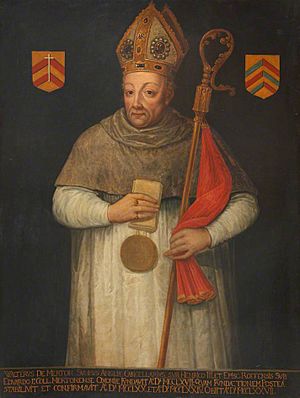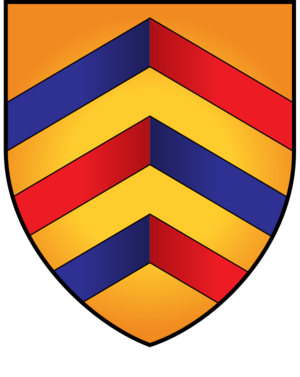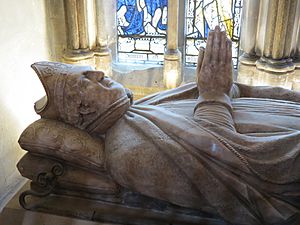Walter de Merton facts for kids
Quick facts for kids Walter de Merton |
|
|---|---|
| Bishop of Rochester | |

Wilhelm Sonmans's fictitious portrait of Walter de Merton, c. 1670
|
|
| Church | Roman Catholic |
| Elected | July 1274 |
| Reign ended | 27 October 1277 |
| Predecessor | Lawrence of St Martin |
| Successor | John Bradfield |
| Other posts | prebendary of St. Paul's, London prebendary of Exeter Cathedral canon of Wells Cathedral |
| Orders | |
| Consecration | 21 October 1274 by Robert Kilwardby, O.P. |
| Personal details | |
| Born | c. 1205 probably Merton |
| Died | 27 October 1277 |
| Buried | Rochester Cathedral |
| Coat of arms |  |
Walter de Merton (born around 1205 – died October 27, 1277) was a very important person in England during the 1200s. He served as the Lord Chancellor of England, which was like being the King's chief minister and legal advisor. He was also a church leader, becoming the Bishop of Rochester. Walter de Merton is most famous for founding Merton College, Oxford, one of the oldest colleges at Oxford University. For a couple of years, he even helped run England when King Edward I was away. Walter de Merton died in 1277 after falling from his horse and is buried in Rochester Cathedral.
Contents
Walter de Merton's Early Life
Walter was born around 1205 into a family that owned land near Basingstoke. We don't know the exact date or place of his birth. His mother was Christina Fitz-Oliver and his father was William. By 1237, both of his parents had passed away. At that time, Walter was already a clerk, which meant he worked for the church. He might have studied at Merton Priory, a type of monastery, and he certainly worked there as a young clerk. In 1241, Walter became a clerk for Nicholas Farnham, who was a former priest and later became the bishop of Durham.
Walter de Merton's Career in Government
Walter quickly became known as a very skilled lawyer and negotiator. He held several church positions across the country. In 1256, he helped the Bishop of Durham with a legal case. By 1258, he was a senior clerk in the government's main office, called the chancery.
Walter impressed King Henry III a lot. When King Henry III went to France in 1259 to sign an important peace agreement called the Treaty of Paris, Walter was left behind as a trusted royal helper. He helped with important government tasks, like organizing soldiers and managing the complex money deals with the King of France. Because of his good work, King Henry III gave Walter a special position at St. Paul's Cathedral in London in 1259.
Becoming Lord Chancellor
On July 12, 1261, King Henry III made Walter de Merton the Lord Chancellor. This was a very powerful job, making him the King's top legal and administrative officer. Walter helped the King with legal arguments and supported the King's power against a group of powerful barons who wanted to limit the King's authority. He also helped the King collect taxes and manage royal income.
In 1262, Walter received more important church positions, becoming a special priest at Exeter Cathedral and a canon at Wells Cathedral. However, in 1263, a powerful baron named Simon de Montfort gained control of the government. Because Walter was a strong supporter of King Henry III, he lost his job as Lord Chancellor.
Founding Merton College
Even when he was busy with government work, Walter de Merton had a big dream: to create a place for scholars to study. In 1261, he set aside some land to support "scholars residing at the schools" near Merton Priory. This was the very beginning of Merton College, Oxford.
In 1264, Walter wrote the rules for a "house of the scholars of Merton." Ten years later, these scholars moved permanently to Oxford. Merton College was one of the first colleges at Oxford to have a common living arrangement for its students, led by a warden. Walter's rules made sure that the college was a place for training priests who would work in the community, not in monasteries. He bought land and houses in Oxford to create the college's permanent home.
Working for King Edward I
Walter de Merton was mentioned as a judge in 1271. After King Henry III died on November 16, 1272, Walter was re-appointed as Lord Chancellor just four days later. The new king, Edward I, was away on a crusade. So, for the first two years of Edward I's reign, Walter de Merton was effectively the leader of England.
He had to deal with many challenges, including complaints about taxes and unrest in London. Walter helped calm the situation and made sure the city's leaders were chosen fairly. He worked hard to keep peace and order in the kingdom until King Edward I returned.
Becoming Bishop of Rochester
King Edward I returned to England in 1274. On September 21, 1274, Walter was replaced as Lord Chancellor by Robert Burnell. As a reward for his loyal service, Walter was chosen to become the Bishop of Rochester in July 1274. He officially became bishop on October 21 of that year.
Walter de Merton's Final Years
For the last three years of his life, Walter divided his time between his duties as Bishop of Rochester and overseeing his new college at Oxford. He was very excited about the future of Merton College.
In 1277, while traveling back from Oxford, Walter fell from his horse while crossing the River Medway. He died two days later, on October 27, 1277, from his injuries. He was buried in Rochester Cathedral, where you can still visit his tomb today. People at the time described Walter de Merton as a generous and very knowledgeable man who was always ready to help religious groups.
Images for kids
 | Stephanie Wilson |
 | Charles Bolden |
 | Ronald McNair |
 | Frederick D. Gregory |




